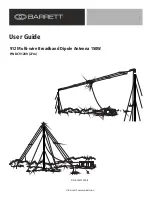
Installation BAT450-F
Release 12 07/2020
61
13.3
11n WLAN module specifications
13.3.1 Radio technology
13.3.2 Roaming
IEEE 802.11F (Inter-Access Point Protocol)
IEEE 802.11r (Fast Roaming)
PMK caching
Pre authentification
OKC (Opportunistic key caching)
Antenna connection
For each WLAN module: 3 × N socket
Range
Depending on the antenna used, frequency range and data rate
Encryption
IEEE 802.11i/WPA2 with passphrase or IEEE 802.1x and
hardware-accelerated AES
Closed Network
WEP 64
a
WEP 128
b
WEP 152
c
User authentication
802.1x/EAP
LEPS
WPA1/TKIP
d
For more information, see the HiLCOS data sheet.
a. With encryptions of the type TKIP and WEP, the device falls back on IEEE 802.11b/g or
IEEE 802.11a.
b. With encryptions of the type TKIP and WEP, the device falls back on IEEE 802.11b/g or
IEEE 802.11a.
c. With encryptions of the type TKIP and WEP, the device falls back on IEEE 802.11b/g or
IEEE 802.11a.
d. With encryptions of the type TKIP and WEP, the device falls back on IEEE 802.11b/g or
IEEE 802.11a.
Frequency range
Support of 2.4 GHz: 2412 MHz to 2472 MHz (for FCC: 2412 MHz
to 2462 MHz)
Support of 5 GHz: 5180 MHz to 5825 MHz (for FCC: 5180 MHz to
5240 MHz and 5745 MHz to 5825 MHz)
Support of 4.9 GHz (for FCC only): 4940 MHz to 4990 MHz
Modulation technology
OFDM: BPSK, QPSK, 16-QAM, 64-QAM
DSSS/CCK, DSSS/DBPSK, DSSS/DQPSK
Radio topology
WLAN Access-Point, Bridge-, Router-, Point-to-Point-, Client-, Client-
Bridge-Mode
















































